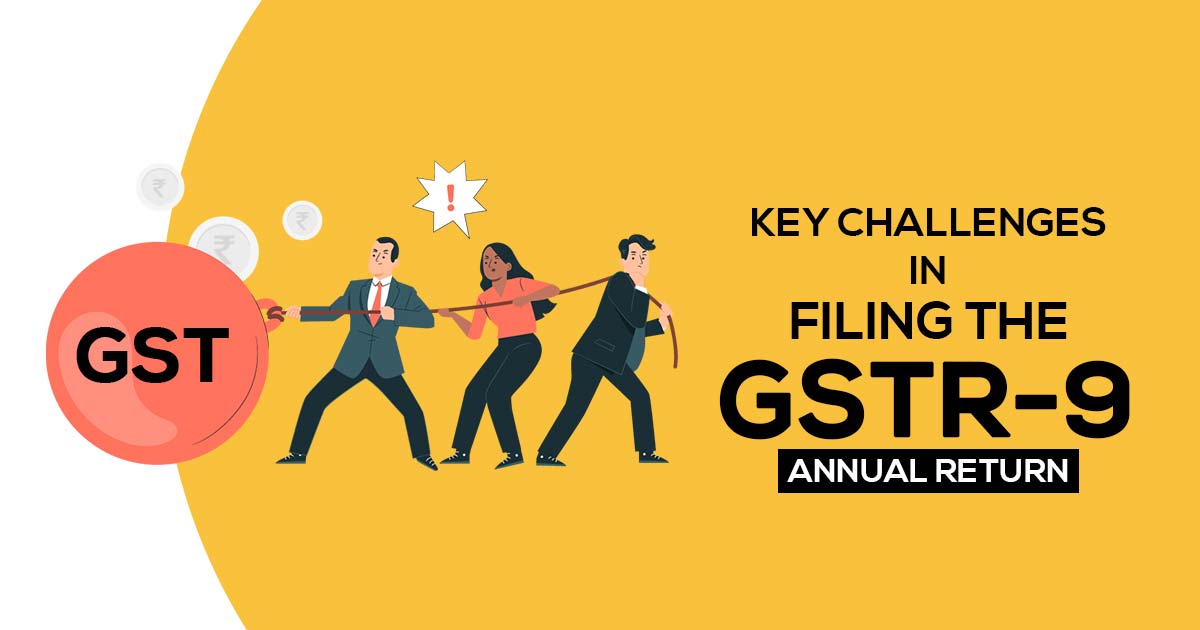
Every regular registered GST taxpayer should file the GSTR-9, which is an annual return. It consolidates all the monthly and quarterly returns (GSTR-1, GSTR-2A, GSTR-2B, and GSTR-3B) submitted in the financial year.
Under GST, filing GSTR-9, the annual return, may be an ineffective business procedure. Various distinct challenges emerge during the process. Below are some challenges faced by businesses while filing the GSTR-9.
Reconciliation Problems
Between GSTR-1, GSTR-3B, and the Books of Accounts, Discrepancies are common for the taxpayers. From the data entry errors or timing mismatches, such discrepancies often emerge. Due to vendor delays or omissions, discrepancies between the claimed Input Tax Credit (ITC) and GSTR-2A/2B can take place.
Data Compilation Challenges
Companies consolidating their financial data for the whole year often struggle with having a higher transaction volume. Categorizing the transactions like taxable, exempt, nil-rated, and zero-rated supplies requires thorough analysis. Determining which ITC is eligible or ineligible for reversal or adjustment takes time to complete.
Errors in Last Tax Returns
When filing GSTR-9, Mistakes in GSTR-1, GSTR-3B, or GSTR-4 cannot be corrected, resulting in incorrect reporting. Underreporting or penalties may be the consequence when unable to report the specific sales or Input Tax Credit (ITC).
Input Tax Credit (ITC) Reversal
From non-payment to suppliers within 180 days, complex cases for ITC reversal can arise. Not tracking the vendor payments might result in ITC reversals. Discovering the accurate reversal provision, precise computation of reversal amount, and reporting reversal in GSTR-9 are the problems for ITC.
Input Tax Credit (ITC) on Exempt and Blocked Supplies
On exempt supplies, ensure the precise computation of Input Tax Credit (ITC) while preventing the input of the restricted supplies, since incorrectness may lead to compliance problems.
ITC Reconciliation and RCM
It may not be easy for businesses to align the taxes filed under the (Reverse Charge Mechanism) RCM with the claimed ITC for the pertinent supplies.
Time Constraints and Technical Challenges
The annual last date to file the returns can not be easier for businesses, particularly during the peak seasons. Technical issues, leading to delays and frustration, may be witnessed on the GST portal. Regular non-compliance can lead to investigations, audits, and legal actions.
Methods to Correct and Avert Errors or Mistakes
- Keeping complete records of all transactions, along with invoices, payments, and documents related to taxes.
- To ease the process of filing and improve accuracy, use the dependable GST software to automate calculations and generate reports.
- For guidance on complex issues, it is suggested to consult with tax Consultants or Chartered Accountants.
- Stay updated about the new GST rules and regulations. Regularly watch the coming updates in GST laws and guidelines issued by the GST Council.
- Start preparing for GSTR-9 before the due date to prevent hurdles. Businesses can reduce the penalties and audit risk by ensuring precise and timely filing.
Closure to the aforesaid, considering the common mistakes made in the GSTR-9 filing, is significant for rectifying the process of compliance. Businesses can rectify the earlier errors and ensure streamlined, error-free filings in the future.
Important FAQs
Q.1 What sort of challenges do small taxpayers suffer at the time of filing GSTR-9?
Often small taxpayers do not have the skills required for GST compliance and may struggle with-
- Comprehending the GSTR-9 needs
- Reconciling data without professionals or accounting software support
Q.2 What takes place if Form GSTR-9 is filed incorrectly?
When the incorrect filing of GSTR-9 is there then the consequence can be-
- Penalties: Charged for late filing or furnishing wrong data
- Interest: Imposed on any late tax payments
- Increased Scrutiny: Leading to audits and investigations
- Legal Action: Feasible in severe matters of fraud or intentional misrepresentation
Q.3 What shall be the GSTR 9 filing turnover limit?
Rs. 2 crore is the settled turnover limit for mandatory filing of GSTR-9. GSTR-9 filing is optional if your annual turnover is below this amount. It is suggested to consult a tax professional to ensure compliance with the updated GST rules and regulations.
Q.4 Who is anticipated from GSTR 9 filing?
Excluding casual taxpayers, input service distributors, and non-resident taxpayers all registered taxpayers must file GSTR-9.
Q.5 Is it obligatory to have HSN code in GSTR 9?
It is obligatory to report HSN (Harmonized System of Nomenclature) codes in GSTR-9, however, the needed level of detail is laid on the aggregate turnover of the taxpayer for the fiscal year.









